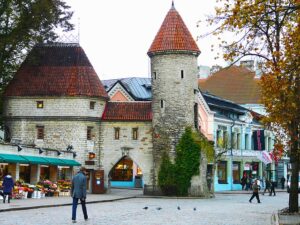
Good news for remote workers who wish to work in a different environment. Estonia is offering a digital nomad visa to anyone interested. The government of Estonian approved the amended of their Alien Act and introduced the digital nomad visa.
A Digital Nomad Visa?
What this means is, citizens of other countries can live in Estonia while working remotely for any company around the world. It’s just the same way people do their remote job, but what is different now is that you can enjoy life in Estonia with a digital nomad visa that spans a year.
Before now, the tourist visa allows citizens of most countries into Estonia for a period of 3 months. Now that the digital nomad visa is introduced, citizens of other countries will be able to stay in Estonia for up to 12 months. The Ministry of the Interior of Estonia confirmed that this will come as both short-term and long-term stay for foreign employers and freelancers in information and communication technology, finance, and marketing.
The Minister of the Interior of Estonia stated that “The digital nomad visa will strengthen Estonia’s image as an e-state and give Estonia a more influential voice on the international level. It will also facilitate the export of Estonia’s e-solutions, which is particularly important in recovering from the current economic crisis,”
Foreigners who identify themselves as a digital nomad can apply in the first stage of the implementation of this new visa policy. The government of Estonia expects 1800 applications each year for this type of visa. In subsequent years, a service provider may be used for the application process.

Is it Worth It?
This is an opportunity for lovers of travel and for those who work remotely. The standard of living in Estonia is considerably lower than in other European countries. However, we cannot say the same when compared to other Baltic countries. In Estonia, the cost of accommodation ranges from €200 and €500 per month. You can live on a monthly budget of €350 for feeding. If you plan to live in the capital city, Tallinn, you may spend more. Transportation is cheap. Estonia is a tech-savvy country, so you enjoy digital life in a safe environment. And you do not have to worry about broadband speed, Estonia has got you covered.
Some other countries also offer long-term visas for digital nomads.
German offers Freelance “Freiberufler” Visa. Only freelancers who come to Germany to perform freelancing jobs considered as liberal are eligible for this visa. Liberal jobs fall into the categories of – “Healthcare, Law, Tax and business counselling, Scientific/technical, Linguistic and information-transmitting”. This type of visa allows you to work in Germany for 3 months. You can convert the visa to resident permit and then extend the resident permit for up to 3 years. Germany also offers a dedicated e-sport visa.
Portugal has a D7 Passive Income visa. This visa allows foreigners to enter Portugal for a year. You will be granted the visa as long as you have enough to sustain you during the period of your stay. You can extend the visa for two years.
Mexico allows foreigners to live and work in the country under the Mexico temporary resident visa. You can stay in the country for up to 4 years by renewing the visa each year.
Norway also offers visas for foreigners who wish to work remotely in Norway. However, this is only available for those who wish to live and work in Svalbard. The visa is valid for as long as you want to stay in Svalbard, but do not rejoice over that, it’s quite an expensive place to stay.
Costa Rica provides a Rentista visa to foreigners who wish to work from the country. This type of visa can last for up to 2 years.

Muchas gracias. ?Como puedo iniciar sesion?